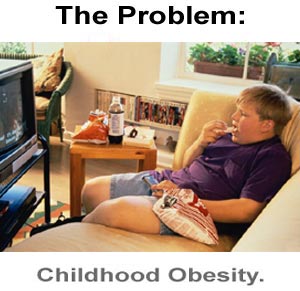

Television, Diet and Advertising:
Why Watching TV Makes You Fat
by Ron Kaufman
The CDC notes that "one-fourth of children in America spend four hours or more watching television daily and only 27 percent of students in grades 9 through 12 engage in moderate physical activity at least 30 minutes a day on five or more days of the week."
According to the CDC, lifestyle behaviors is one of the major factors contributing to obesity in children and adults. Genetics does play a role, however, many health risks have been proved to significantly diminish when physical activity increases and diet improves. One major suggestion by health officials is a reduction in "screen time." The VERB campaign promotes a decrease in time spent in a sedentary-TV-watching position and replace it with positive physical and prosocial activities.
"The average tween spends four and a half hours each day in front of a screen. This includes watching television, video-tapes or DVDs, playing video games, using a computer or browsing the Internet. Television is the medium with which children spend the most time -- two and a half hours each day.
26 percent of U.S. children watch four or more hours of television per day.
67 percent of U.S. children watch two or more hours per day.
Almost half (48 percent) of all families with tweens have all four of the latest media staples: TV, VCR, video game equipment and a computer.
The bedroom of the 21st century child is a multimedia environment. Of children 9 - 13 years old, more than half (57 percent) have a TV in the bedroom; 39 percent have video game equipment; 30 percent have a VCR; 20 percent a computer and 11 percent Internet access." (VERB Fact Sheet)
The American Academy of Pediatrics issued a position paper in February 2001 which noted that its research has shown that "children and adolescents are particularly vulnerable to the messages conveyed through television, which influence their perceptions and behaviors. Many younger children cannot discriminate between what they see and what is real. Research has shown primary negative health effects on violence and aggressive behavior; sexuality; academic performance; body concept and self-image; nutrition, dieting, and obesity; and substance use and abuse patterns."
The AAP report went on to present some moderate guidelines that pediatricians should recommend to parents:
Limit children's total media time (with entertainment media) to no more than 1 to 2 hours of quality programming per day.
- Remove television sets from children's bedrooms.
- Discourage television viewing for children younger than 2 years, and encourage more interactive activities that will promote proper brain development, such as talking, playing, singing, and reading together.
- Monitor the shows children and adolescents are viewing. Most programs should be informational, educational, and nonviolent.
View television programs along with children, and discuss the content. Two recent surveys involving a total of nearly 1500 parents found that less than half of parents reported always watching television with their children.
- Use controversial programming as a stepping-off point to initiate discussions about family values, violence, sex and sexuality, and drugs.
- Use the videocassette recorder wisely to show or record high-quality, educational programming for children.
- Support efforts to establish comprehensive media-education programs in schools.
- Encourage alternative entertainment for children, including reading, athletics, hobbies, and creative play. (Pediatrics. Volume 107, Number 2. February 2001, pp 423-426)
Turn off TV; Turn on Life!

No comments:
Post a Comment